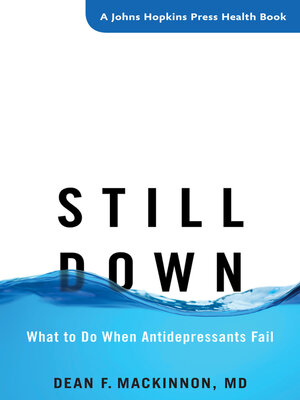Still Down
ebook ∣ What to Do When Antidepressants Fail · Johns Hopkins Press Health
By Dean F. MacKinnon

Sign up to save your library
With an OverDrive account, you can save your favorite libraries for at-a-glance information about availability. Find out more about OverDrive accounts.
Find this title in Libby, the library reading app by OverDrive.



Search for a digital library with this title
Title found at these libraries:
| Library Name | Distance |
|---|---|
| Loading... |
Expert insight and advice to help people with treatment-resistant depression feel better.
Major depressive disorder is a common medical condition that can be disabling and can persist for months, even years. Many people experience depression symptoms that resist treatment. Although they try various combinations of medications, psychotherapy, or electroconvulsive therapy, their symptoms don't improve. What can people who have treatment-resistant depression do to overcome their depression and feel better?
In Still Down, Dr. Dean F. MacKinnon, a psychiatrist at Johns Hopkins Medical School, presents nine composite stories drawn from patients he has seen in his twenty years as an expert in treatment-resistant mood disorders. The first section of the book features people diagnosed with depression who have not yet received appropriate treatment. The next section looks at misdiagnosis, focusing on people who feel and appear depressed but who have different mood disorders and need treatment for them. Finally, Dr. MacKinnon describes people who have severe depression that does not respond to any treatment, regardless of how finely tuned the treatment might be. These people, who suffer from true treatment-resistant depression (TRD), can benefit from a variety of treatments to feel better.
Dr. MacKinnon provides commentary to explain and extend the discussion of the patients and situations in each case. He also discusses common obstacles to improvement, including overly conservative dosing, problems stemming from not adhering to treatment, antidepressant failure, and high sensitivity to side effects. By identifying aspects of the individual's qualities, behaviors, and experiences that may account for poor response to treatment, Still Down points the way for people with TRD and their families to find appropriate diagnoses and the best possible care.







